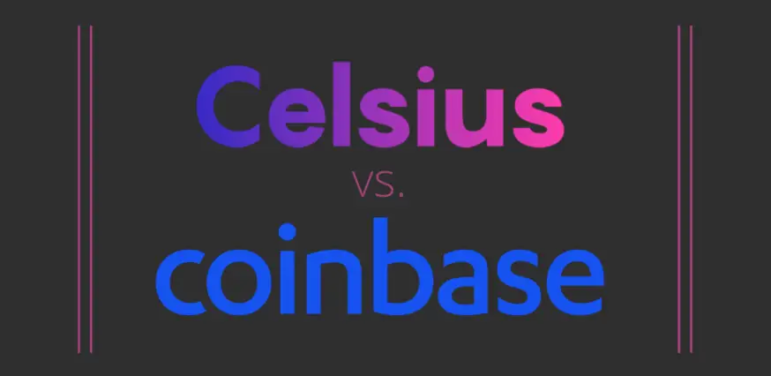MasterBitExpress Wallet is an application for sending and receiving Bitcoins. You own Your inherent data, count with privacy and decide where Your wallet is going to be backed up. Using Blockchain technology, transactions are automatically signed from within the wallet once required, transparently to the user, so that a seamless, privacy oriented and secure, experience of paying and receiving funds, is the main objective of MasterBitExpress.
Get It OnContact usThis article is originally posted at Coincentral.com
Celsius Network vs. Coinbase is a comparison often made on the basis of passively earning interest on cryptocurrency deposits, but the two platforms are distinctly different.
Celsius Network is a cryptocurrency lending platform that provides crypto-backed loans and pays out interest on popular cryptocurrency assets like Bitcoin and Ethereum, and stablecoins like USDC.
Coinbase, on the other hand, is the most popular cryptocurrency exchange in the United States; its cryptocurrency interest account feature merely exists as an auxiliary service.
In short, Celsius is a newer company, but is better established in the cryptocurrency interest account niche and offers higher rates, whereas Coinbase is better established in the overall cryptocurrency ecosystem and is starting to offer interest features.
The following Celsius Network vs. Coinbase will explore each platform’s advantages and how they stack up against each other.
Celsius Network vs Coinbase: Key Information
| Celsius Network | Coinbase | |
| Reviews | Our Review | Our Review |
| Site Type | Crypto lending app with borrowing and lending | Cryptocurrency Exchange + Basic Crypto Interest Account |
| Beginner Friendly | Yes | Yes |
| Mobile App | Yes | Yes |
| Buy/Deposit Methods | Crypto deposits, debit card, bank transfer | Credit Card, Debit Card, Bank Transfer, Crypto Deposits |
| Sell/Withdrawal Methods | External crypto wallet transfer | PayPal, Bank Transfer, Withdrawal to External Crypto Account |
| Available Cryptocurrencies | Bitcoin, Ethereum, Link, and several others | Bitcoin, Ethereum, Litecoin, and 58 more |
| Company Launch | 2017 | 2012 |
| Location | London, England | San Francisco, CA, USA |
| Community Trust | Great | Great |
| Security | Good | Great |
| Customer Support | Great | Good |
| Verification Required (KYC) | Yes | Yes |
| Fees | Excellent (there are none) | Medium |
| Site + Promo | $50 sign-up bonus after transferring $400 or more and holding for 30 days. | $10 bonus when buying or selling $100 or more in cryptocurrency. |
Company Bios: Celsius vs. Coinbase?
Celsius was founded in 2017 by Alex Mashinsky and Daniel Leon. The company has raised approximately $100 million in private funding rounds. It manages more than $15 billion in community assets, boasting more than 850,000 users.

A screenshot of Celsius Network homepage.
Coinbase was launched by Brian Armstrong and Fred Ehrsam in 2012. The company is based out of San Francisco, CA, and has about 56 million users, as of July 2021. Coinbase has more than $220 billion in assets under management.

A screenshot of Coinbase’s homepage.
Coinbase recently IPOd on the New York Stock Exchange and stock in the company can now be purchased under the ticker symbol $COIN. As of the time of writing, the company has a market capitalization of nearly $48 billion.
Feature #1: Interest Rates: Who Has Higher APY, Celsius or Coinbase?
Coinbase only offers interest rates on a select few cryptocurrencies, and they’re modest at best. If your primary goal is to earn the highest APY possible, Celsius Network is a better option.
Coinbase offers staking rewards on Cosmos, Tezos, and, Ethereum, and USDC (its stable coin). Here are the current rates:
- Cosmos: up to 7.5%
- Tezos: up to 7.5%
- Ethereum: up to 5%
- USDC: 0.15%
One important thing to note is that consumers who use Coinbase’s Ethereum staking must lock their ETH into a smart contract. This smart contract won’t unlock the ETH until Ethereum moves to a Proof of Stake model. Coinbase may eventually give its users a way to still trade the ETH they’ve locked in this smart contract, but there’s no option to do this at the present moment.
Celsius offers a hearty APY on a large number of crypto assets. The company updates its rates each week.
As a reference point, here’s a recent snapshot of Celsius’ rates as of December 2021:
- BTC – 6.2% for the first two BTC, then 3.51% after
- ETH – 5.05%
- CEL – 4.86%
- SNX – 13.99%
- MATIC – 8.99%
- USDC – 10.02%
- AAVE – 5.92%
- DASH – 4.6%
- COMP – 4.6%
- BCH – 4.51%
- UMA – 4.51%
- EOS – 4.45%
- LTC – 4.08%
- ZRX – 3.51%
- BAT – 3.51%
- XLM – 3.10%
- ETC – 3.0%
- LINK – 3.0%
- KNC – 2.53%
- UNI – 2.50%
- BSV – 2.02%
- ZEC – 2.02%
- OMG – 2.02%
- MANA – 2.02%
If your decision to choose a winner from Celsius vs. Coinbase is strictly APY, Celsius is the clear winner.
How Do Celsius and Coinbase Make Money?
Celsius makes its money by lending out the assets that it manages at a higher rate than what it pays out to the users who deposit those assets.
For example, the company might offer loans with a 9% interest rate but only pay out the people who deposited the funds that will be used for the loan at a rate of 6%.
The loans that Celsius gives out are over-collateralized, which makes the risk of default relatively low.
Coinbase makes its money through transaction fees. Whenever a user makes a trade on the Coinbase exchange, they must pay a percentage of that trade to Coinbase.
If you’d like to get a more in-depth insight into the specifics of how Coinbase’s business model works, we recommend checking out its SEC Form S-1 filing– it shows a nitty-gritty breakdown directly filed by Coinbase.

The Coinbase S-1 Filing
Feature #2: Payouts and Withdrawals
Celsius’ payouts and withdrawal policies are fairly favorable for users who prefer to get paid on a weekly basis; Celsius depositors receive their interest every Monday.
Celsius also lets users withdraw their funds whenever they want without incurring any fees. There is a soft cap on withdrawals of $50,000+ in a 24-hour period, and these may take 24 to 48 hours to process.
Assets that are staked through Coinbase accrue interest daily. But customers may not be able to withdraw that interest (or their assets) for up to 35 to 40 days from the time of depositing.
Coinbase doesn’t charge any fees for withdrawals.
Feature #3: Celsius vs. Coinbase Security
Celsius secures its users’ funds through a system called multiparty computation (MPC). This is in line with industry standards.
Celsius Network also enables users to take charge of their own security, with features like:
- 2-factor authentication
- PINs
- Email and manual verifications for withdraws
- Biometric security options
- Photo and video security
Coinbase offers industry-leading security features; it keeps about 98% of the assets that it holds in cold storage. It’s also one of the only crypto companies to offer FDIC insurance for up to $250,000 on USD funds– note this does not apply for digital assets like BTC or USDC.
Coinbase offers PINs, 2-factor authentication, and a feature called Vaults, where users can store assets that can’t be removed from Coinbase for 72 hours after a withdrawal’s initiation.
Feature #4: Ease of Use
Both Celsius and Coinbase are beginner-friendly; complete crypto beginners should be able to use either platform without much difficulty.
Celsius has a robust mobile platform, which makes it a great fit for people who want to manage their crypto investments on the go. It also lets users make deposits and withdrawals with standard financial instruments like bank accounts and debit cards.
Coinbase, however, takes the cake when it comes to ease of use; it’s perhaps the most user-friendly cryptocurrency platform, and has been designed as such to usher mostly complete newcomers into the cryptocurrency ecosystem.
Pro tip: Coinbase’s user-friendliness comes at a cost– higher than usual fees. If you want to save on transaction fees with Coinbase, start by creating an account on Coinbase. Then transfer fiat to Coinbase Pro and trade on that platform for lower fees, or check out a Coinbase alternative.
Celsius Network vs. Coinbase: Standout Features
Celsius’ standout feature is its native cryptocurrency, CEL. Users who hold CEL can qualify for up to 25% discounts on loan interest payments; and international users can also elect to “Earn in Cel” to earn higher rates than “Earning in Kind.”
Coinbase’s standout feature is Coinbase Pro. Like the standard Coinbase exchange, Coinbase Pro lets users buy, sell, and trade various cryptocurrency assets, but at significantly lower fees. It also includes more cryptocurrency tokens than the company’s standard site.
Coinbase also offers users the opportunity to earn cryptocurrency by learning about various projects.

Coinbase Learn
The Court of Public Opinion: Reddit Likes Both Celsius and Coinbase
Most people on Reddit and in the broader review platforms tend to see Celsius vs. Coinbase as complimentary platforms rather than competitors.
Celsius focuses primarily on excelling as a great cryptocurrency interest platform, whereas Coinbase is concerned with being the easiest cryptocurrency exchange to use.
Some Reddit users have (correctly) pointed out that there are risks to using a cryptocurrency asset platform like Celsius, but rarely is Celsius accused of being riskier than any of its direct competitors. Celsius is often one of the first recommendations for people asking about cryptocurrency interest accounts.
People tend to complain about Coinbase’s high fees, but the solution to this problem is simple: use Coinbase Pro and your trading fees will be much lower.
Celsius Network vs. Coinbase Customer Support
Celsius claims to offer 24/7 customer support, but it doesn’t say which of its support options is available 24/7. U.S. customers can fill out a contact form on the company’s website or call 201-824-2888.
Coinbase has an online FAQ page that customers can visit to get answers to common questions. Users also have the option of submitting an email request to Coinbase. However, the company doesn’t offer live phone support.
Customer support is gridlock for Celsius vs. Coinbase.
Can You Trust Celsius Network and Coinbase?
Celsius and Coinbase are two of the most trusted cryptocurrency platforms.
Celsius is trusted by more than 850,000 users, and has implemented plenty of user-facing security features to help users keep their assets secure. We do need to mention that Celsius’ third-party marketing server was breached in 2021. This led to some Celsius customers getting phishing emails from hackers. Users who followed solid internet security practices were never put at risk of losing their funds.
Coinbase offers great user-facing security options, it holds 98% of user funds in cold storage and offers FDIC insurance for USD assets. The company is also publicly traded, and a hack would likely be terrible for shareholder value.
Incentives for both platforms are directly aligned to user safety and security.
Celsius Network vs Coinbase: Which is the Better Crypto Interest Account?
Celsius and Coinbase aren’t heated direct competitors in the cryptocurrency interest account niche, yet. We believe this may change as the crypto interest account industry grows and Coinbase continues to expand its offerings.
For the time being, Celsius beats Coinbase as a feature users seek out most from trusted crypto interest sites– higher APY on a wider variety of assets. It has offered between 8.88% to 12% on stablecoins, including Coinbase’s own USDC, and it consistently beats Coinbase on other digital assets like Bitcoin and Ethereum across the board.
However, both platforms can be used in tandem with one another. Coinbase and Coinbase Pro can be used to purchase many of the assets Celsius offers higher APYs on, directly with fiat– a feature that Celsius itself lacks. Once those assets are purchased, they can be sent to Celsius to start accruing interest for cheap.
CoinCentral readers can get a $50 sign-up bonus (paid in BTC) when signing up for Celsius and making a transfer of $400 or more and holding for 30 days.
You can also get $10 on Coinbase when buying or selling $100 or more in cryptocurrency.
The post Celsius Network vs Coinbase: Which Crypto Interest Account is Best appeared first on CoinCentral.










Comments are closed.